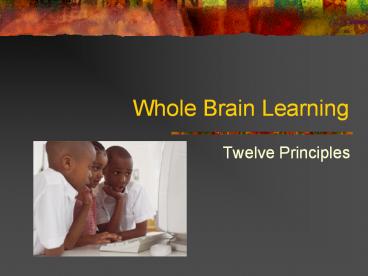Whole%20Brain%20Learning - PowerPoint PPT Presentation
Title:
Whole%20Brain%20Learning
Description:
Whole Brain Learning Twelve Principles 1. Brain is a parallel processor Imagination, thoughts emotions operate and interact simultaneously teachers need to use ... – PowerPoint PPT presentation
Number of Views:180
Avg rating:3.0/5.0
Title: Whole%20Brain%20Learning
1
Whole Brain Learning
- Twelve Principles
2
1. Brain is a parallel processor
- Imagination, thoughts emotions operate and
interact simultaneously - teachers need to use variety of approaches to
reinforce brains holistic approach
3
2. Learning engages entire physiology
- Stress, threat and boredom limit the brains
ability to learn - teachers should invoke sense of excitement and
contextualisation
4
3. Innate search for meaning
- Can only be channelled and focused
- lessons need to be meaningful and contextualised
5
4. Search for meaning through patterning
- Brain resists meaningless patterns
- students should be allowed to create meaningful
and personalised patterns
6
5. Emotions are critical to patterning
- Emotions and cognition cannot be separated -
essential for storage and recall of information - caring emotional climate needed
- students need time to engage in reflection and
metacognition
7
6. Brain process wholes and parts simultaneously
- Neither should be overlooked
- vocabulary and grammar best in genuine holistic
experiences - equations and science/math principles in living
context - social studies in community context
8
7. Learning involves focused attention,
peripheral perception
- Class environment, enthusiasm, community, family
and technology all affect learning
9
8. Learning involves conscious and unconscious
processes
- We learn more than we understand, remember what
we experience, not just what we are told - teaching should emphasise active processes of all
acquired information
10
9. We have different learning systems
- Spatial - instant memory of experiences
- Rote - deals with facts and skills in isolation -
requires more practice for recollection - memorisation is sometimes useful
- too much interferes with understanding
11
10. Understanding and Memory
- Best when facts and skills embedded in natural,
spatial memory. Experiential learning sets
spatial memory in motion - teachers need to use real life activities with
complex interactive experiences
12
11. Enhanced by challenge - inhibited by threat
- teachers should create state of relaxed alertness
and anticipation - provide students with life-relating
intellectually challenging problems
13
12. Each brain is unique
- Each set of systems (stem, emotional and
rational) integrates differently - teaching should be multi-faceted to allow all
students to express their visual, tactile,
emotional and auditory preferences























![[DOWNLOAD]⚡️PDF✔️ The Everything Whole Grain, High Fiber Cookbook: Delicious, heart-healthy snac PowerPoint PPT Presentation](https://s3.amazonaws.com/images.powershow.com/10077185.th0.jpg?_=20240711107)







